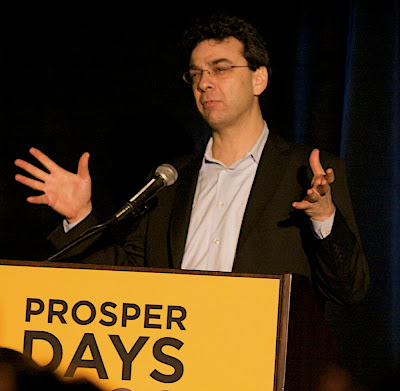
Dubner is a likeable, funny guy, and an excellent speaker. He's clearly been at this for some time. In his presentation for Prosper Days he focused on the same general topic, the overarching topic, of Freakonomics: the study of incentives, but zeroed in particularly on the quality of research and how that quality reflects (poorly or well) real life.

Scrutiny tweaks the outcome. For example, there is a difference between "stated preferences" and "revealed preferences". If the people in a room are asked to raise their hands if they wash their hands after using a public toilet close to 100% will raise their hands. If, instead, researchers slyly count the number of persons washing their hands after using a public toilet they find that about 30% do not. This difference obviously comes from a factor known as "scrutiny".

What are the rewards, Dubner asks, for truthfulness? What is the cost of dishonesty? These are the questions that bring us a true understanding of incentives.
Gaming the Altruists . Dubner applauded the Prosper crowd for its apparent altruism. He then launched into the research on altruism in humans, taking us from "conventional wisdom" that says humans are innately altruistic (I am not sure how conventional that wisdom is, myself; I do not think humans are innately altruistic and don't know that I ever have) through the "Dictator Game" and beyond, to conclusions that, surprise surprise, vary with the rules of the game - the way the research is designed.

Who done it. The results of a research project are also affected by the person(s) doing the research. That is, the persons who interact with the research subjects. It turns out that no matter how well-designed the project is, the greatest cooperation will be obtained when requested by blonde women. I guess we all knew that already, though, didn't we?

Unassuming. Dubner kept coming back to the questions we ask and those we don't. Sometimes we have to ask questions in different ways at different times to separate ourselves from our own assumptions. Sometimes we don't think to ask the simple questions.
All of these elements affect the value of research. It's a mistake to rely upon research until you have reviewed how it was done and by whom.
Dubner's speech drew upon elements of the next book he and Leavitt plan to publish in about a year. Throughout his talk he referred to works by others, notably Predictably Irrational: The Hidden Forces that Shape Our Decisions, by Dan Ariely. Dubner's message, overall, was to question not only authority but also conventional wisdom when trying to predict the behavior of others or, for that matter, ourselves. We don't always or even often behave rationally. Perhaps by knowing some of the motives behind our own behavior we can prevent ourselves from making serious mistakes.

No comments:
Post a Comment